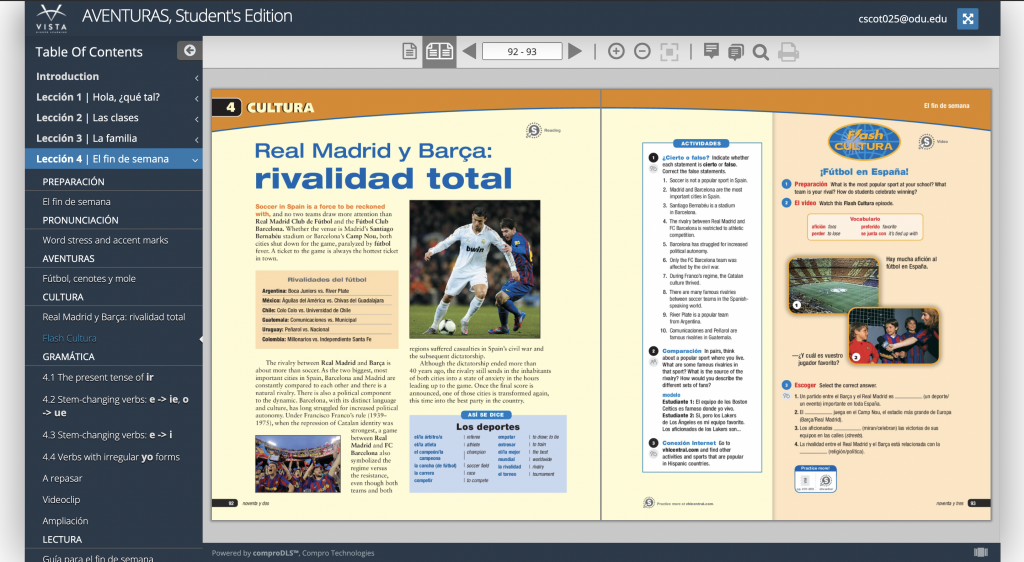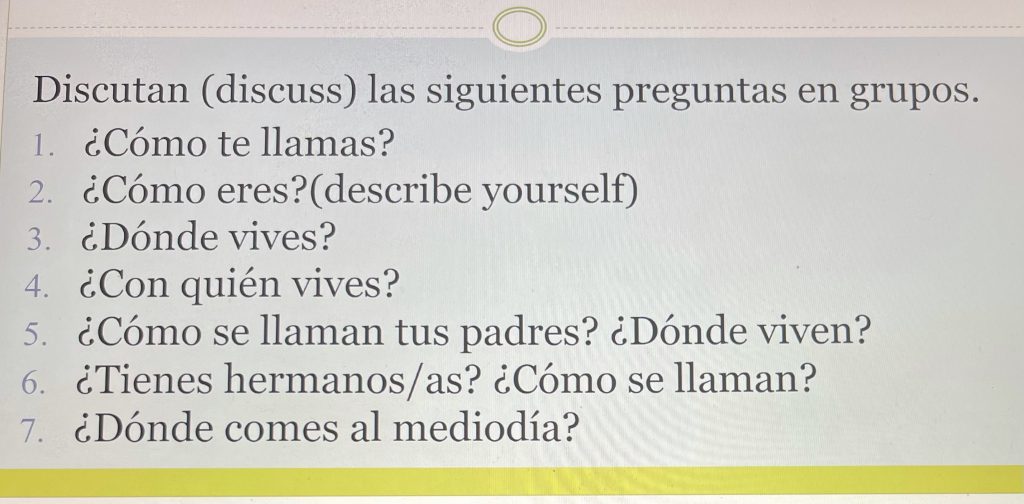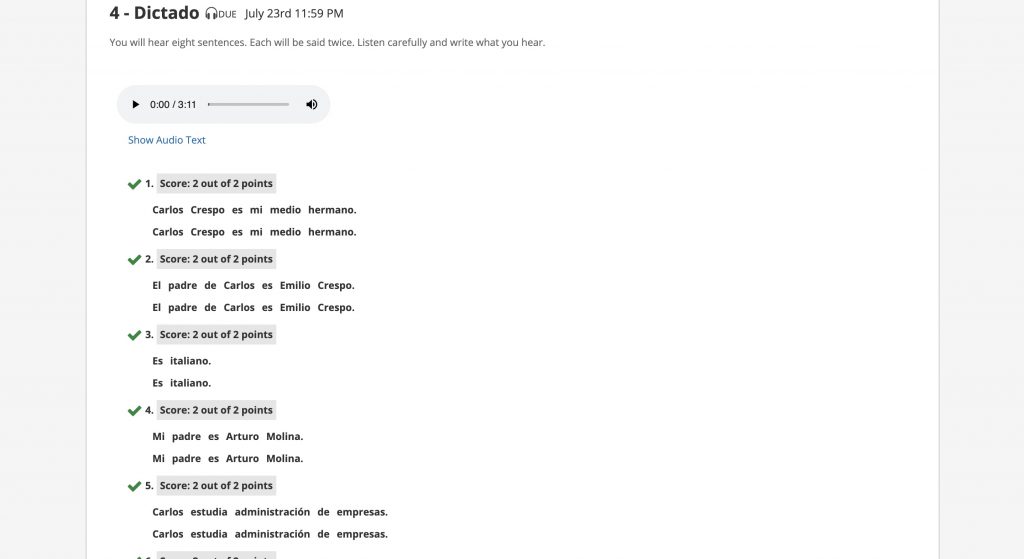Interpretive, Interpersonal, and Presentational Modes of Communication
Exploring Culture
In this class, we had assignments called Competencia Cultural. Each of these assignments required us to watch and listen to a video in which we were exploring different Spanish-speaking cultures and how in different areas of Spanish-speaking countries people practiced different things.
These assignments helped me to see how different many cultures can be. For example, the last Competencia Cultural assignment was about fútbol. To many Americans like myself when we hear that we instantly think tackles, but in the Hispanic culture, it’s actually soccer that they are referring to. You can see how it’s like a common tradition amongst all families in the Hispanic culture to celebrate and attend events to watch their favorite teams play soccer against each other. It was an amazing short film. It made me realize how great it feels for everyone to come together and celebrate something as a whole.

Engaging in Communities
It is very important to be involved and engaged within your community. It helps to be not only informed of what’s going on around you but also to be in control of what goes on around you. When engaging in your immediate community you get first-hand experiences as to what happens in your environment and when it comes down to improving that environment you have the opportunity to fully chip in and aid in the growth and success of your community.
I have not yet been able to be involved in my community, but I look forward to giving back to my community in the journey to me starting my career because I believe that in my community we need more people like me vouching for the mental health of those who live around me. There is a lack of support in that area and one person has the power to change a lot.
Interpersonal Communication
During this class, we’ve had both an interview with a classmate and an interview with our Professor. All of the content we learned in the class led up to the preparation of the interviews. At the end of each week, we would have a list of questions from the current and previous chapter in which we were to use what we learned in the chapter to answer the questions.
Before the first interview, we had a lot of time in class and an extended period outside of class to prepare for our interview with a classmate. At first, things were a little difficult, especially with trying to be fluent in our responses but also having to understand what our classmates were asking us. We were to use no English at all. This helped me to grow a lot because it helped me to focus more on speaking only Spanish, not just in that interview, but in the rest of the class. In the first interview, I had butterflies, but with the second one, I felt more confident in the conversation. The most difficult thing with these assignments was being fluent and trying not to speak any English at all, but I felt like overall I did a good job. I just focused on being confident in my responses and actively listening to the questions to aid in the help of my fluency. Something I know I could work on that would definitely help with my fluency is studying fewer hours at a time, but more throughout each day. Below is my interview with one of my classmates:
Presentational Speaking
In this class, we had many things that we were to participate in. After going over the PowerPoint for a topic of the chapter we were covering we would always do an activity where we would each go into breakout rooms and discuss the activity with 1-2 other classmates, or we would just take a couple of minutes to go over it ourselves, then be called to share our answers to the class.
The most challenging thing with the class participation activities was just getting to know the different learning styles of my classmates because I had to use those to be able to communicate and complete each class activity. Some people needed a little encouragement in helping them to be able to even speak up and some people were outgoing and made it a smoother conversation to have. It was easy to work through that challenge and I got to learn so much about so many of my fellow classmates. I definitely learned new vocabulary every day working with different people. I also liked that it helped my fluency overall in the class and allowed me to be more comfortable learning to speak a different language because essentially we were all just learning and growing together in this course. Below is a set of questions we discussed in our breakout rooms:

Presentational Writing
In this class, we had a couple of writing assignments that we had to complete. They were called Composición. We had Composición 1 and 2. The first one had us write in Spanish as if we were on a website to meet other Spanish-speaking people. The second one was about our families and having to talk about our family to a friend.
Both assignments were pretty easy concepts. We were preparing for the composition assignments with what we learned in the class during the week. The most difficult part was not translating from English to Spanish, but having to just write it all in Spanish like we sort of doing in class. I did pretty well in both. One thing I would’ve changed was turning in the final part to my 1st composition so that I can see how I improved from the draft to the final, but I was able to do that with the 2nd composition assignment. I liked how the classes themselves with the participation activities we had to do really helped to formulate the compositions. Below, I will insert my composition 1 draft and the composition 2 final:
Composicion-1Composicion-2-Final
Interpretive Listening
Every week in the class there was homework due every Friday. Each week the homework was based on the chapter we were currently covering. In each week’s homework, we had listening activities where we had to listen and answer questions or listen and write what we heard.
Each homework assignment was very clear and straightforward. You were given a listening activity where you either had to answer whether what you heard was correct or false or you were given a sentence, in which they repeated it once, and you had to write down what you heard. The good thing about these assignments was that you had an unlimited amount of tries to get them correct. The most difficult part about these assignments was that sometimes I would misinterpret what was being said and probably just misspelled something like a name or place. To help I listened to what was being said very carefully and trying to sound out what I could hear, but that was also difficult at times being as though this is a whole different language I am learning. A takeaway I got from these assignments was that you have to listen very carefully because some things sound alike and could be misinterpreted if not paying attention. These activities actually helped a great deal when it came down to the interviews we had in class because they made listening easier. Below is what one of the listening assignments looked like:

Interpretive Reading
In this class, we were always reading. We read in class when going over powerpoints or even doing class participation. We also read in our homework assignments as well. For example, almost every week we had an assignment called Lectura where we would read something from the textbook and answer the questions that followed.
These assignments were the easiest to comprehend, but sometimes reading and answering questions was difficult. For example, in our last Lectura it was a little more difficult than the previous ones because it required more than just skimming over the textbook, but actually reading to correctly answer the questions because some of the answers weren’t just in plain sight. My takeaway from these assignments was that each time I had to read something in Spanish it was getting easier. I was finding myself reading more fluently and actually understanding what things meant and also being able to use context clues to figure out, what something I didn’t quite catch right away, meant. Below is an example of a Lectura assignment:
